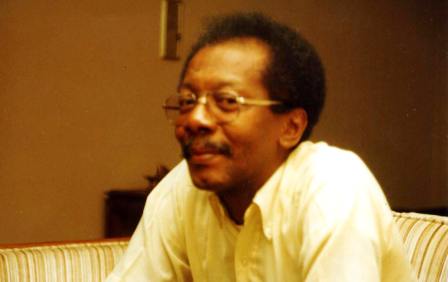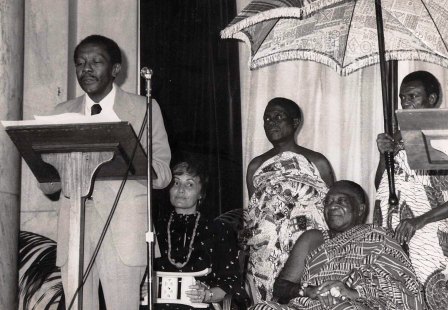 |
|
Ray Vernon
Spriggs
First African American Peace Corps Volunteer.
Served in Ghana in the 60s |
| |
| |
|
 |
|
Ray Spriggs
Delivering the welcome address
at the US Congress on the occasion
of the Asantehene, the late Otumfuor Opoku
Ware II's
(under umbrella) visit in the early 80s |
| |
| |
|
RAY SPRIGGS ALSO KNOWN AS
DR. SPRIGGS
E. Ablorh-Odjidja
Ray Vernon Spriggs died peacefully, one afternoon in March 28, 1996, at
his home on New Hampshire Avenue in Washington, DC. His
death was sudden, and it came as shock to friends and
family alike.
Suddenly, those of us saddled with guilt for infrequent
church attendances were compelled to grab the Bible for
comfort. I, for instance, had to scour my memory for
verses from the Bible to pay tribute to him.
The verse I remembered, thanks to memories of parents
and childhood, was from 1st CORINTHIANS, Chapter 13, and
I quote:
BUT WHETHER THERE BE PROPHECIES, THEY SHALL FAIL
WHETHER THERE BE TONGUES, THEY SHALL CEASE
WHETHER THERE BE KNOWLEDGE, IT SHALL VANISH AWAY
FOR WE KNOW IN PART, AND WE PROPHESY IN PART
BUT WHEN THAT WHICH IS PERFECT IS COME
THEN THAT WHICH IS PART SHALL BE DONE AWAY.
On the day of the Memorial at the Union Temple Baptist
Church in S.E Washington, D.C., I stood at the lectern,
face wet, and read the above when it came my turn to pay
tribute to him.
I wished the good Lord to
guide Ray to the next world; to that state of perfection
that was promised in the verse.
Who was Ray Spriggs?
Those who knew him well knew him as a
physically small person, but
also a man with a big heart and enough courage to
fit the body of a lion.
Ray was the first African-American to enlist in the
Peace Corps.
Imagine the courage of a 25
year old American youth, who, fed by visions of
the Tarzan movies of the
period - about the so called
primitive and "wicked exploits" of the natives
of this continent; still caught in the
dark ages, ready and waiting behind
vast boiling pots to feed on
the next benevolent missionary
or stranger in their midst - decided to go to Africa
anyway!
Then imagine Ray, young from the
new world of America, West Chester, Pennsylvania,
precisely.
You would also happen on a puzzle
and a question; why go to Africa at such a
tender age?
For those who knew Ray well, the choice for going to
Africa was an act of nature; a man responding to the
call of heritage and character. He went to Africa to
serve because he knew he was African.
Ray was an educator. He enrolled in the Peace Corps when
it was founded in 1961. He was sent to Ghana.
After serving in Ghana for two years, he returned
on his own to work as a
teacher with the Ghana Ministry of Education.
After Ghana, Ray worked for the Peace Corps again as
training director in several countries,
including Liberia.
He was a graduate of Henderson High School, in West
Chester, PA. He had his undergraduate degree from
Lincoln University, PA and his Master
of Education degree from the University of PA. Along the
way, he attended specialty courses and received
certificates from Howard University, University of
California at Berkeley and the University of Ghana at Legon, Ghana.
Ray was a civil rights activist too. A passage from his
obituary read:
“Since his early youth, Ray marched to his own drum. He
organized protest marches to further the cause of civil
rights for African Americans. He continued his activism
in Washington, DC area as a tenant organizer and as
children’s advocate.”
The obituary continued: “He was known to ‘shoot from the
hip’, giving straight forward opinion on any issue. From
the western shores of the Motherland to the halls of
Congress and the D. C. Government council chambers to
the frequent forums held in his living room, family and
friends have come to rely upon Ray for his wit and
wisdom. A source of solace, insight, and enlightenment,
one was always buoyed by his generosity of spirit,
subtle humor, and keen intellect.”
Ray was born on October 5, 1937, in West Chester, PA, to
the late Harry A. and Anna V. Spriggs.
I met Ray Vernon Spriggs some twenty-five years ago in
Washington, D.C through a mutual friend, E. C. O. Addy,
whom Ray had taught at Fijai Secondary School during his
Peace Corps days in Ghana.
Friends called him Mr. Spriggs. At other times we called
him Dr. Spriggs on account of his legendary wit, sometimes wry humor, and
his ability to
hurl
all this at
a target with deadly accuracy.
But some of us took comfort in the belief that to make things equal,
the Good Lord also made him a very sensitive soul.
Ray had a dual
fascinating character - quick
to anger as he was to laughter. He would use humor
lavishly, but turn the same on him, and you would be
asking for trouble.
But above all this was
Ray's hospitality, which new no
bounds.
Fortunate for him, he had an
understanding wife, Velva, who
tolerated beyond human capacity the sometimes raucous and
argumentative nature of the guests Ray invited in at all
hours.
A visit to Ray was always a lengthy
one because he expected it so. He would urge
friends to stay and when persuasion failed, he would
resort to his famous closure
for all visits: “Wo be ko a ko”, a Ghanaian phrase
meaning, “if you must go then out.” At that point, he
would be first at the door to show the "ingrate" out,
foot planted firmly apart, and with a hand holding the
door for your exit.
No
one was
spared this "ignominious" exit, especially
those who refused to stay a bit longer after a lavish
hospitality!
Fortunately, the unhappy
parting would be forgotten the next day.
And another invitation would be extended to the same group
of friends.
Conversations with Ray were no small talk. They bordered
on the educational, and the inspirational. The philosophical
outlook of things. The discussions and the arguments.
Books read. Poems recited. And oh, his favorite poem was
Langston Hughes’ “Mother to Son.” I wouldn’t be able to
count the number of times I heard him recite:
Well, son,
I tell ya.
Life for me ain’t been no crystal stair.
It’s had tacks in it,
And splinters,
And boards torn up….
You have
only to imagine friends in their early or mid twenties,
many of whom had left the familiarity and comfort of
their homes in Africa for a new cultural setting and
then add to this the hospitality provided by this
generous African-America and you would understand how
sorely Ray would be missed by this group.
Ray would go on in his baritone voice, spreading
knowledge about America to this
group, with the same convivial manner on each visit,
from beginning of the year and right into Christmas.
At Christmas, surrounded by children, sons, nephews and
adopted nephews, and friends, Ray would burst into his
favorite season song – “Santa Claus is coming to town.”
And you would wonder why he thought there was some cheer
left for Santa to bestow after he, Ray, had given it out
in buckets each day and throughout
the year!
Many will
miss Ray.
Many from Africa were provided the opportunity to
come to the United States through Ray’s generosity. And
for those who found themselves here
without his help, he did not
neglect. But for those who became his inner circle of
friends, he made sure they
understood the American way of
life; its
history and cultural nuances, its privileges and
opportunities as well as its pitfalls and what he called
“latent racism” in the larger
American society.
His Memorial Service at Union Temple Baptist Church was
attended by a cross section of America. All the ethnics
were in attendance; Africans, African-Americans,
Hispanics, Whites – they all knew Ray.
Early in 1996, Ray had talked lengthily about a trip to
Ghana. When he died in March that same year, some us
concluded instantly that Ray had finally made the
journey home. His spirit, long departed from Africa for
some 300 years. finally had made it home.
Go on home, Ray
Three hundred years is enough to be away
Go rest in peace.
E. Ablorh-Odjidja, Washington DC April 16, 2004
|








